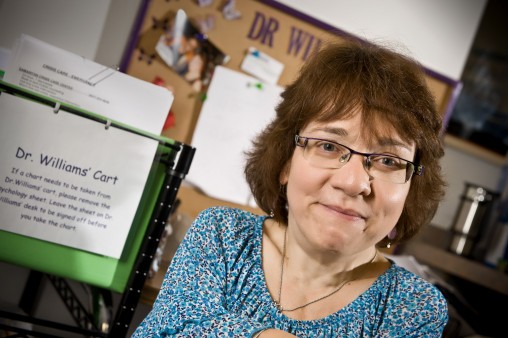
Julie Williams, associate professor in the School of Professional Psychology, is one of the organizers of the Breaking Silences, Demanding Crip Justice: Sex, Sexuality and Disability conference at Wright State Nov. 4 to 6.
Wright State University will host the Breaking Silences, Demanding Crip Justice: Sex, Sexuality and Disability conference from Nov. 4 to Nov. 6.
It is the product of a planning team comprised of cross-campus and community-campus partners.
Members of the disability, Deaf, LGBTQ and gender nonconforming communities, disability rights activists, scholars, writers, artists and community members who serve those with disabilities are encouraged to attend. This is the first such conference to be held at Wright State.
Speakers include Sins Invalid, a group of queer and gender-variant performance artists and performance artists of color who explore themes of sexuality, embodiment and the disabled body; Harilyn Rousso, author of the book “Don’t Call Me Inspirational: A Disabled Feminist Talks Back”; and Martha Banks, author of the three-volume “Disabilities: Insights from across Fields and around the World.”
“This event provides an opportunity to finally celebrate disability as a diversity variable that adds to, rather than diminishes, the person,” said Julie Williams, associate professor in the School of Professional Psychology. “I hope this conference empowers those who identify as a person with a disability or as a Crip to become the experts of their bodies and sexuality.”
The conference addresses “a largely overlooked and silent topic within the disability community, sexuality, and will do so through the lens of Crip theory,” said Williams. “For those who do not identify as a member of the disability community, it is an opportunity to learn how they can become allies.”
Crip is an inclusive term, representing all disabilities. Crip embodies the contemporary disability rights wave and reflects the political reclaiming of the historically derogatory term “cripple.”
Williams “has provided this conference with a progressive vision that challenges us all to examine our assumptions and actions,” said Nikki Rogers, a planning team member and assistant professor of community health in the Boonshoft School of Medicine. “‘Doing things right’ for this conference is as important, and perhaps even more important, than staging the conference itself.”
Attendees must be at least 18 years of age. The organizers are seeking individuals to submit artwork related to disability and sexuality. Companies and representatives may register to exhibit by Sept. 30.
Registration is required. The conference includes lectures, workshops and meals. Early registration (students, $75 for all three days; non-students, $200) ends Oct. 1 and standard registration (students, $75 for all three days; non-students, $225) runs from Oct. 2 to Oct. 28. On-site registration will also be available.
Movie night, Nov. 5, is a social event with dinner and a movie. It requires a $35 separate registration and is open to both conference attendees and the public. The featured film is “The Sessions” about the struggles of Mark O’Brien, a journalist, poet, polio survivor and advocate for the disabled.
For more information about the conference or to register, visit wright.edu/event/sex-disability-conference.
For questions concerning registration, contact Julie Williams at 937-775-3407 or Julie.williams@wright.edu.
For other questions, contact Nikki Rogers at 937-258-5549 or nikki.rogers@wright.edu.

 Wright State alum Lindsay Aitchison fulfills childhood space-agency dream
Wright State alum Lindsay Aitchison fulfills childhood space-agency dream  Wright State business professor, alumnus honored by regional technology organizations
Wright State business professor, alumnus honored by regional technology organizations  Wright State University Foundation awards 11 Students First Fund projects
Wright State University Foundation awards 11 Students First Fund projects  Gov. DeWine reappoints Board Treasurer Beth Ferris and names student Ella Vaught to Wright State Board of Trustees
Gov. DeWine reappoints Board Treasurer Beth Ferris and names student Ella Vaught to Wright State Board of Trustees  Joe Gruenberg’s 40-Year support for Wright State celebrated with Honorary Alumnus Award
Joe Gruenberg’s 40-Year support for Wright State celebrated with Honorary Alumnus Award 